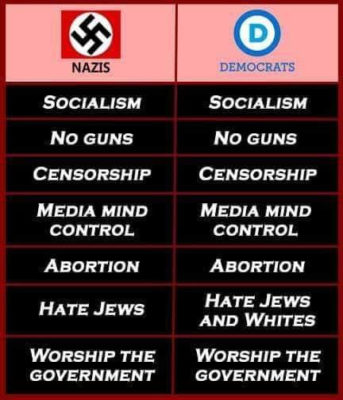Sucktion 230 is all about accountability for thee but not for me. It is free speech battle… sorta. It’s not a battle for Leftist speech. It’s only a battle for conservative speech. There is actually no movement afoot to restrict the speech of Leftists. But, the President’s tweets almost always receive a flag or fact-check.
Prominent news outlets are receiving week-long bans for posting factual stories. Conservatives are done with Twitter. There must be solutions to fight big tech discrimination. Running from the problem changes nothing. Soon conservative candidates won’t have access to the most vital forms of communication. Conservatives will lose elections.
There is still hope. Here is something we can do. The first tool in the toolbox to win this fight is to strip Big Tech of Sucktion 230 protection. We want speech to once again have First Amendment protection. Stripping Big Tech of section 230 protections is the action under the most discussion today.
This is because it’s an essential starting point to curb bias. President Trump made headlines by threatening to veto the 2021 NDAA unless it repeals Sucktion 230. Sucktion 230 is a small portion of the Communications Decency Act of 1996 (CDA).
The road to hell is paved with good intentions
The CDA was an attempt at preventing minors from accessing sexually explicit materials on the Internet. The Act itself was an addition to the Telecommunications Act of 1996. The intent of the Telecomm Act was to expand competitiveness on the internet. The CDA was an addition, an amendment (Title V) months later. That’s how Sucktion 230 became law.
Sucktion 230 dictates that:
“no provider or user of an interactive computer service shall be treated as the publisher or speaker of any information provided by another information content provider.”
Tech companies are not publishers. They cannot be held legally responsible for the content others post to their platforms. It also allows big tech companies to remove and block content it deems to be:
“obscene, lewd, lascivious, filthy, excessively violent, harassing, or otherwise objectionable, whether or not such material is constitutionally protected.”
The law’s only boundary is; removal of speech must be an act of “good faith.”
Sucktion 230 intends to allow internet companies to block harmful content. Further, it allows them to avoid consequences for content put out by their users. Section has since been subject to hijacking. It now paves way for Big Tech to shadow-ban, silence, and squash conservative thought. And to do so without consequence.
Pushing for repeal?
Rep. Matt Gaetz is on the frontlines of the fight against Big Tech discrimination. He’s leading a push for the repeal of Sucktion 230. Gaetz said in an email:
“Right now, technology companies enjoy special immunities that even local newspapers, even your television network doesn’t enjoy in terms of their responsibility for content…”
Sucktion 230 pertains to “interactive computer services.” The definition of the term is “any information service, system, or access software provider that provides or enables computer access by multiple users to a computer server.” Meaning this privilege only applies to big tech companies like Twitter, Facebook, and Google. It’s a special treat for social media platforms and no one else.
Rep. Ken Buck said:
“Section 230 protects big tech in ways, at least it’s been interpreted to protect them in ways that allow them to discriminate… Their bias shows in the algorithm they have created.”
Rep. Buck is a member of the Judiciary Subcommittee on Antitrust, Commercial and Administrative Law. He recently published a report under the title “The Third Way” in which he spells out his solutions to big tech bias. Buck said:
“Section 230 protects big tech in ways, at least it’s been interpreted to protect them in ways that allow them to discriminate… Their bias shows in the algorithm they have created.”
Where we are is not where we intend to be
Gaetz and Buck argue these companies are not acting in good faith. Therefor the protections are subject to revocation. Gaetz said:
“[Big tech companies] enjoy those protections because they hold themselves out to be unbiased and neutral platforms… But if they aren’t willing to demonstrate they, in fact, are unbiased and neutral, I think we should repeal that section of law.”
With the protections gone, these companies will be responsible. Their blatant behavior bias against conservative users then becomes subject to normal accountability.
Repealing Sucktion 230 does come with difficulties. Buck notes “it’s not the best alternative.” Holding Big Tech companies responsible for acting outside the bounds of what a fair and neutral platform would do is beneficial. Accidentally squashing those big tech company’s competitors is a possibility. This outcome would make the problem worse.
Opponents to repealing Sucktion 230 argue the sole thing protecting alternatives to big tech companies is Sucktion 230. Without its protections, sites could face suits for a user leaving a bad review. That’s the argument. A massive multi-billion dollar corporation could fight frivolous lawsuits. A startup could not.
Buck said, “You don’t want lawsuits against a company when they don’t control the content of what is being put on their site… We need to create in section 230 a protection that smaller startups can use moving forward.”
It is not a complex issue… There’s just a lot of money on all sides
Like most issues in politics, the repeal of section 230 is has many wealthy factions. Twitter is no longer a neutral platform. Clearly Twitter acts against conservatives. It should not retain the special privileges found in Sucktion 230. But frivolous lawsuits might crush any free market solution to these tech giants.
“We could make it clear what 230 covers and what it doesn’t cover,” Buck suggests. Any such reform could be hard to enact. It seems likely the elected officials with the assignment will soon receive donations from the violators. We call it pay to play and it happens all day long in D.C.
